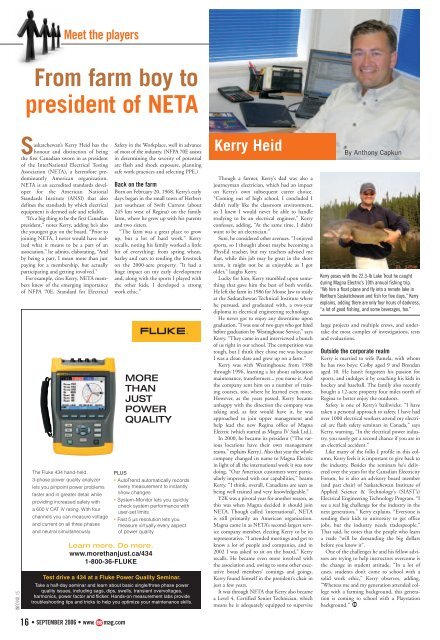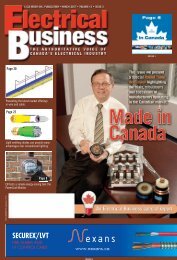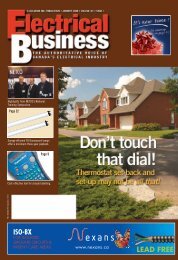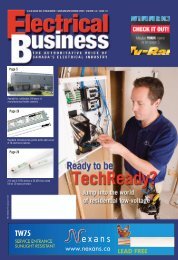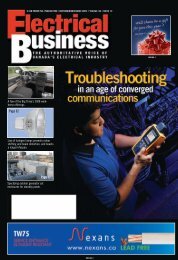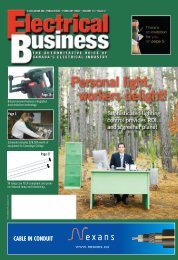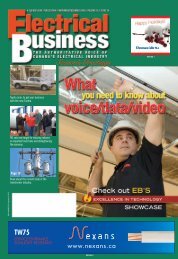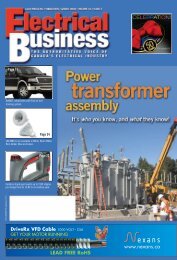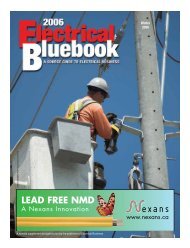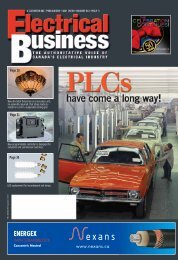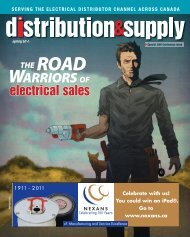September 2006.pdf - Electrical Business Magazine
September 2006.pdf - Electrical Business Magazine
September 2006.pdf - Electrical Business Magazine
You also want an ePaper? Increase the reach of your titles
YUMPU automatically turns print PDFs into web optimized ePapers that Google loves.
Meet the players<br />
From farm boy to<br />
president of NETA<br />
INFO NO. 15<br />
Saskatchewan’s Kerry Heid has the<br />
honour and distinction of being<br />
the first Canadian sworn in as president<br />
of the InterNational <strong>Electrical</strong> Testing<br />
Association (NETA), a heretofore predominantly<br />
American organization.<br />
NETA is an accredited standards developer<br />
for the American National<br />
Standards Institute (ANSI) that also<br />
defines the standards by which electrical<br />
equipment is deemed safe and reliable.<br />
“It’s a big thing to be the first Canadian<br />
president,” notes Kerry, adding he’s also<br />
the youngest guy on the board. “Prior to<br />
joining NETA, I never would have realized<br />
what it means to be a part of an<br />
association,” he admits, elaborating, “And<br />
by being a part, I mean more than just<br />
paying for a membership, but actually<br />
participating and getting involved.”<br />
For example, cites Kerry, NETA members<br />
knew of the emerging importance<br />
of NFPA 70E, Standard for <strong>Electrical</strong><br />
The Fluke 434 hand-held,<br />
3-phase power quality analyzer<br />
lets you pinpoint power problems<br />
faster and in greater detail while<br />
providing increased safety with<br />
a 600 V CAT IV rating. With four<br />
channels you can measure voltage<br />
and current on all three phases<br />
and neutral simultaneously.<br />
MORE<br />
THAN<br />
JUST<br />
POWER<br />
QUALITY<br />
PLUS<br />
• AutoTrend automatically records<br />
every measurement to instantly<br />
show changes<br />
• System-Monitor lets you quickly<br />
check system performance with<br />
user-set limits<br />
• Fast5µsresolutionletsyou<br />
measure virtually every aspect<br />
of power quality<br />
Learn more. Do more.<br />
www.morethanjust.ca/434<br />
1-800-36-FLUKE<br />
Safety in the Workplace, well in advance<br />
of most of the industry. (NFPA 70E assists<br />
in determining the severity of potential<br />
arc flash and shock exposure, planning<br />
safe work practices and selecting PPE.)<br />
Back on the farm<br />
Born on February 20, 1968, Kerry’s early<br />
days began in the small town of Herbert<br />
just southeast of Swift Current (about<br />
245 km west of Regina) on the family<br />
farm, where he grew up with his parents<br />
and two sisters.<br />
“The farm was a great place to grow<br />
up, but a lot of hard work,” Kerry<br />
recalls, noting his family worked a little<br />
bit of everything: from spring wheat,<br />
barley and oats to tending the livestock<br />
on the 2000-acre property. “It had a<br />
huge impact on my early development<br />
and, along with the sports I played with<br />
the other kids, I developed a strong<br />
work ethic.”<br />
Test drive a 434 at a Fluke Power Quality Seminar.<br />
Take a half-day seminar and learn about basic single/three phase power<br />
quality issues, including sags, dips, swells, transient overvoltages,<br />
harmonics, power factor and flicker. Hands-on measurement labs provide<br />
troubleshooting tips and tricks to help you optimize your maintenance skills.<br />
Kerry Heid<br />
Though a farmer, Kerry’s dad was also a<br />
journeyman electrician, which had an impact<br />
on Kerry’s own subsequent career choice.<br />
“Coming out of high school, I concluded I<br />
didn’t really like the classroom environment,<br />
so I knew I would never be able to handle<br />
studying to be an electrical engineer,” Kerry<br />
confesses, adding, “At the same time, I didn’t<br />
want to be an electrician.”<br />
Sure, he considered other avenues. “I enjoyed<br />
sports, so I thought about maybe becoming a<br />
PhysEd teacher, but my teachers advised me<br />
that, while this job may be great in the short<br />
term, it might not be as enjoyable as I got<br />
older,” laughs Kerry.<br />
Lucky for him, Kerry stumbled upon something<br />
that gave him the best of both worlds.<br />
He left the farm in 1986 for Moose Jaw to study<br />
at the Saskatchewan Technical Institute where<br />
he pursued, and graduated with, a two-year<br />
diploma in electrical engineering technology.<br />
He never got to enjoy any downtime upon<br />
graduation. “I was one of two guys who got hired<br />
before graduation by Westinghouse Service,” says<br />
Kerry. “They came in and interviewed a bunch<br />
of us right in our school. The competition was<br />
tough, but I think they chose me was because<br />
I was a clean slate and grew up on a farm.”<br />
Kerry was with Westinghouse from 1988<br />
through 1996, learning a lot about substation<br />
maintenance, transformers... you name it. And<br />
the company sent him on a number of training<br />
courses, too, where he learned even more.<br />
However, as the years passed, Kerry became<br />
unhappy with the direction the company was<br />
taking and, as fate would have it, he was<br />
approached to join upper management and<br />
help lead the new Regina office of Magna<br />
Electric (which started as Magna IV Sask Ltd.).<br />
In 2000, he became its president (“The various<br />
locations have their own management<br />
teams,” explains Kerry.). Also that year the whole<br />
company changed its name to Magna Electric<br />
in light of all the international work it was now<br />
doing. “Our American customers were particularly<br />
impressed with our capabilities,” beams<br />
Kerry. “I think, overall, Canadians are seen as<br />
being well trained and very knowledgeable.”<br />
Y2K was a pivotal year for another reason, as<br />
this was when Magna decided it should join<br />
NETA. Though called ‘international’, NETA<br />
is still primarily an American organization.<br />
Magna came in as NETA’s second-largest service<br />
company member, electing Kerry to be its<br />
representative. “I attended meetings and got to<br />
know a lot of people and companies, and in<br />
2002 I was asked to sit on the board,” Kerry<br />
recalls. He became even more involved with<br />
the association and, owing to some other executive<br />
board members’ comings and goings,<br />
Kerry found himself in the president’s chair in<br />
just a few years.<br />
It was through NETA that Kerry also became<br />
a Level 4, Certified Senior Technician, which<br />
means he is adequately equipped to supervise<br />
By Anthony Capkun<br />
Kerry poses with the 22.3-lb Lake Trout he caught<br />
during Magna Electric’s 10th annual fishing trip.<br />
“We hire a float plane and fly into a remote lake in<br />
Northern Saskatchewan and fish for five days,” Kerry<br />
explains, adding there are only four hours of darkness,<br />
“a lot of good fishing, and some beverages, too.”<br />
large projects and multiple crews, and undertake<br />
the most complex of investigations, tests<br />
and evaluations.<br />
Outside the corporate realm<br />
Kerry is married to wife Pamela, with whom<br />
he has two boys: Colby aged 9 and Brendan<br />
aged 10. He hasn’t forgotten his passion for<br />
sports, and indulges it by coaching his kids in<br />
hockey and baseball. The family also recently<br />
bought a 12-acre property four miles north of<br />
Regina to better enjoy the outdoors.<br />
Safety is one of Kerry’s bailiwicks: “I have<br />
taken a personal approach to safety. I have had<br />
over 1000 electrical workers attend my electrical<br />
arc flash safety seminars in Canada,” says<br />
Kerry, warning, “In the electrical power industry,<br />
you rarely get a second chance if you are in<br />
an electrical accident.”<br />
Like many of the folks I profile in this column,<br />
Kerry feels it is important to give back to<br />
the industry. Besides the seminars he’s delivered<br />
over the years for the Canadian Electricity<br />
Forum, he is also an advisory board member<br />
(and past chair) of Saskatchewan Institute of<br />
Applied Science & Technology’s (SIAST’s)<br />
<strong>Electrical</strong> Engineering Technology Program. “I<br />
see a real big challenge for the industry in the<br />
next generation,” Kerry explains. “Everyone is<br />
sending their kids to university to get office<br />
jobs, but the industry needs tradespeople.”<br />
That said, he notes that the people who learn<br />
a trade “will be demanding the big dollars<br />
before you know it”.<br />
One of the challenges he and his fellow advisors<br />
are trying to help instructors overcome is<br />
the change in student attitude. “In a lot of<br />
cases, students don’t come to school with a<br />
solid work ethic,” Kerry observes, adding,<br />
“Whereas me and my generation attended college<br />
with a farming background, this generation<br />
is coming to school with a Playstation<br />
background.”<br />
16 • SEPTEMBER 2006 • www. mag.com


